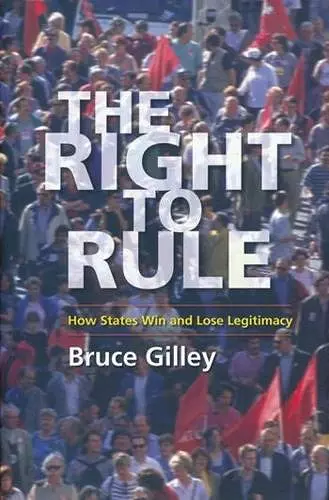The Right to Rule
How States Win and Lose Legitimacy
Format:Hardback
Publisher:Columbia University Press
Published:13th Mar '09
Currently unavailable, and unfortunately no date known when it will be back

Bruce Gilley's The Right to Rule is one of the most promising contributions to political theory in a long time. -- Charles Tilly, Joseph L. Buttenwieser Professor of Social Science, Columbia University, and author of Why? What Happens When People Give Reasons... and Why The increasing incidence of failing and failed states makes the study of political legitimacy of growing importance to policymakers and analysts. This comprehensive and unique work makes great strides in advancing our understanding of the factors that affect variation in the right to rule, across nations and over time. Bruce Gilley uses public opinion and data from seventy-two countries, as well as material taken from case studies, to help us understand why legitimacy is so solid in some nations and so fragile in others. By emphasizing the centrality of legitimacy to politics and political stability, The Right to Rule definitively refutes those who have dismissed the importance of political legitimacy. -- Mitchell A. Seligson, Centennial Professor of Political Science, Vanderbilt University Bruce Gilley does a wonderful job of organizing the literature on legitimacy and governance. He then adds an ambitious empirical effort to explore whether legitimacy is important in governance and, if so, which elements of legitimacy are key. This book is a must read for those interested in understanding the factors that lead to successful vs. failing states. -- Tom Tyler, University Professor, New York University, and author of Why People Obey the Law
Popular perceptions of a state's legitimacy are inextricably bound to its ability to rule. Vast military and material reserves cannot counter the power of a citizen's belief, and the more widespread the crisis of a state's legitimacy, the greater the threat to its stability. Even such established democracies as France and India are losing their moral claims over society, while such highly illiberal states as China and Iran enjoy strong showings of public support. Through a remarkable fusion of empirical research and theory, Bruce Gilley makes clear the link between political consent and political rule. Fixing a definition of legitimacy that is both general and particular, he is able to study the role of legitimacy as it has been maintained and lost in a diverse selection of societies. He begins by detailing the origins of state legitimacy and the methods governments have used to wield it best. He then considers the habits of less successful states, exploring how the process works across different styles of government. Gilley's unique approach merges a broad study of legitimacy and performance in seventy-two states with a detailed empirical analysis of the mechanisms of legitimation. The results are tested on a case study of Uganda, a country that, after 1986, began to recover from decades of civil war. Considering a range of explanations of other domestic and international phenomena as well, Gilley ultimately argues that, because of its evident real-world importance, legitimacy should occupy a central place in political analysis.
[An] important and ambitious book Survival This work is both normatively and empirically rich; its focus on data and methodology illuminates the subject rather than obscuring it...highly recommended. Choice A useful and long-overdue attempt to define and measure the important idea of legitimacy. -- Vsevolod Gunitskiy Political Science Quarterly
ISBN: 9780231138727
Dimensions: unknown
Weight: unknown
336 pages